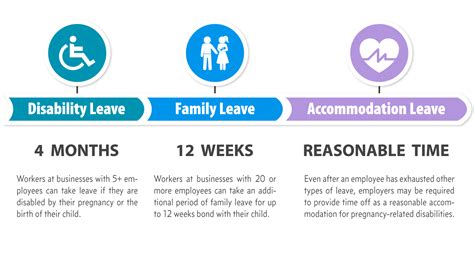Duration Of Maternity Leave Explained

Maternity leave is the time off work that a mother takes before and after the birth of her child. The duration of maternity leave varies from country to country and even from employer to employer. In this article, we will be discussing the duration of maternity leave, its importance, and what to expect during this time.
Why is Maternity Leave Important?
Maternity leave is important for the physical and mental well-being of the mother and the child. It allows the mother to recover from childbirth, establish breastfeeding, and bond with her newborn. It also provides the child with the care and attention they need during the first few months of their life.
Duration of Maternity Leave Around the World
The duration of maternity leave varies greatly from country to country. Some countries offer generous maternity leave policies, while others do not offer any leave at all. Here are some examples:
- In the United States, there is no federal law mandating paid maternity leave. However, some states do offer paid leave.
- In the United Kingdom, mothers are entitled to up to 52 weeks of maternity leave.
- In Canada, mothers are entitled to up to 18 months of maternity leave.
- In Sweden, mothers are entitled to up to 480 days of maternity leave, which can be shared with the father.
Duration of Maternity Leave by Employer
Even within the same country, the duration of maternity leave can vary depending on the employer. Some employers offer more generous maternity leave policies than others. It is important to check with your employer to see what their policy is.
What to Expect During Maternity Leave
During maternity leave, you can expect to take time off work to care for your newborn and recover from childbirth. You may also choose to breastfeed your baby, which can take up a lot of your time during the day and night. It is important to take care of yourself during this time and get plenty of rest.
Returning to Work
When it is time to return to work, it can be a difficult transition. You may feel guilty about leaving your baby, or you may worry about how you will balance work and motherhood. It is important to communicate with your employer about your needs and to make a plan for your return to work.
FAQs
How much maternity leave am I entitled to?
The amount of maternity leave you are entitled to depends on your country and employer. Check with your employer to see what their policy is.
Can I take maternity leave if I am adopting a child?
Yes, many countries offer maternity leave for adoptive parents as well.
Can I work during my maternity leave?
It depends on your employer’s policy. Some employers allow you to work from home or work part-time during your maternity leave, while others require you to take the full duration of the leave off.
What if my employer does not offer maternity leave?
If your employer does not offer maternity leave, you may be able to take unpaid leave or use vacation or sick time. Check with your employer to see what your options are.
What should I do to prepare for my maternity leave?
Before your maternity leave, it is important to communicate with your employer about your plans and to make a plan for your return to work. You may also want to consider hiring a caregiver or nanny to help with your newborn while you are on leave.
Conclusion
Maternity leave is an important time for mothers and their newborns. The duration of maternity leave varies from country to country and employer to employer, but it is important to take as much time off as you need to recover from childbirth and bond with your baby. Remember to communicate with your employer about your needs and to take care of yourself during this time.
